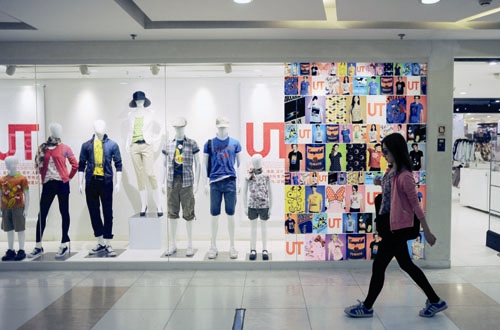

Upon payment, for example, users are redirected to a tailor-made page by Alibaba Group's most popular online marketplace, where transactions and delivery are fulfilled through the Taobao channel.
Gap, in contrast, deployed a hybrid model. owning a self-run website and at the same time operating on Tmall.com, the business-to-consumer branch of Alibaba.
|
 |
|
A uniqlo store in Beijing. The on-line store of the Japanese fast-fashion brand charges 7 to 15 yuan ($2) per order, depending on different geographical areas. [Photo/China Daily] |
At the same time, H&M runs a Chinese-language website but only displays merchandise without supporting online purchases.
The concept of a Chinese online business is not the same as setting up an operation in China, said Burghardt Groeber, vice-president of Hybris AG's Asia-Pacific branch in Hong Kong, a provider of multichannel commerce software.
"Sometimes certain vendors have large volumes of shipments and revenues generated from the Chinese market on a daily basis but they don't even have a Chinese operation," Groeber said.
As foreign vendors try to drum up interest from Chinese customers they have to joust with local e-commerce rivals.
For foreign fast-fashion brands it is a big challenge to effectively replicate the success they had in the brick-and-mortar world where they outplayed traditional fashion retailers with smaller volumes and seasonal collections, said Vladimir Djurovic, president of Labbrand Enterprise Management Consulting in Shanghai.
"What foreign fast fashion brands are facing is the risk that local early specialists, such as Vancl and m18.com, could outplay them," he said.
For instance, Vancl is the largest business-to-consumer direct apparel retailer in China, with its own designers, manufacturing, alliances and largely self-owned logistics system.
According to Djurovic, they are entering a new competitive environment and need to build new skills just to be able to compete, such as logistics expertise, online shopping experience and online communications acumen.
Major challenges
Serge Hoffmann, a Hong Kong-based partner at Bain & Co, pointed out that sound delivery services and friendly online trading have played a vital role in building a critical mass of Chinese users.
Logistics is of the utmost importance for online business in China. For foreign apparel vendors, the one thing they have is their brand, said Jeff Baum, senior vice-president at Manhattan Associates Asia-Pacific, a company that facilitates supply chains.
For instance, if Zara is handling online orders from its Spanish headquarters, maybe it takes longer for them to deliver, Baum said. But if they can redistribute through the marketplace, it means that somebody has bought a lot of their stuff and can sell it online for them.
"If people manage to get Zara from someone else who delivers faster, they might probably shop there first," he added.
Also, how local players usually beat their foreign counterparts is through free shipping. Zara exempts delivery fees on minimum purchases costing 299 yuan ($47.70). Uniqlo charges 7 to 15 yuan per order, depending on different geographical areas.
 Young female chef performs for five-star hotel guests
Young female chef performs for five-star hotel guests
 Apple's CEO Tim Cook's eight visits to China
Apple's CEO Tim Cook's eight visits to China
 Student designs clothes for private clients
Student designs clothes for private clients
 Wine market shrugs off slump as consumers raise their glasses
Wine market shrugs off slump as consumers raise their glasses
 Top 10 most generous companies in China
Top 10 most generous companies in China
 Shenzhen fair highlights growing cultural exports to China
Shenzhen fair highlights growing cultural exports to China
 From financial translator to bookstore owner
From financial translator to bookstore owner
 Qingdao international auto show opens
Qingdao international auto show opens
 China property investment rises 7.2% in Jan - April
China property investment rises 7.2% in Jan - April
 China's fixed-asset investment up 10.55% in Jan - April
China's fixed-asset investment up 10.55% in Jan - April